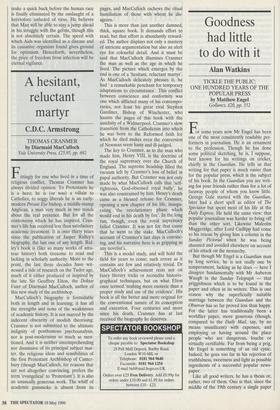A hesitant, reluctant martyr
C.D.C. Armstrong
THOMAS CRANMER by Diarmaid MacCulloch Yale University Press, £25.95, pp. 692 Fittingly for one who lived in a time of religious conflict, Thomas Cranmer has always divided opinion. To Protestants he is a hero; he is (or was) a villain to Catholics; to soggy liberals he is an early- modern Private Eye bishop, a middle-stump Anglican, a man very much in two minds about the real presence. But for all the controversy which he has inspired, Cran- mer's life has received less than satisfactory academic treatment. It is over thirty years since the publication of Jasper Ridley's biography, the last one of any length. Rid- ley's book is (like so many works of ama- teur history) both tiresome to read and lacking in scholarly authority. More to the point, the last three decades have wit- nessed a tide of research on the Tudor age, much of it either produced or inspired by the late Sir Geoffrey Elton, the Doktor Pater of Diarmaid MacCulloch, author of this new study of the archbishop.
MacCulloch's biography is formidable both in length and in learning; it has all the strengths and none of the weaknesses of academic history. It is not marred by the indecent obscurity of modish theorising: Cranmer is not submitted to the ultimate indignity of posthumous psychoanalysis, nor is post-modernism so much as men- tioned. And it is neither uncomprehending nor dismissive of its principal subject mat- ter, the religious ideas and sensibilities of the first Protestant Archbishop of Canter- bury (though MacCulloch, for reasons that are not altogether convincing, prefers the term 'evangelical' to 'Protestant'). It is also an unusually generous work. The whiff of academic gunsmoke is absent from its pages, and MacCulloch eschews the ritual humiliation of those with whom he dis- agrees.
This is more than just another damned, thick, square book. It demands effort to read, but that effort is abundantly reward- ed. The author displays not only a mastery of intricate argumentation but also an alert eye for colourful detail. And it must be said that MacCulloch illumines Cranmer the man as well as the age in which he lived. The picture which emerges by the end is one of a 'hesitant, reluctant martyr'. As MacCulloch delicately phrases it, he had a remarkable penchant for temporary adaptations to circumstance'. This conflict between conscience and conformity was one which afflicted many of his contempo- raries, not least his great rival Stephen Gardiner, Bishop of Winchester, who haunts the pages of this book with the assiduity of a Widmerpool. Cranmer's slow transition from the Catholicism into which he was born to the Reformed faith for which he died makes even the conversion of Newman seem hasty and ill-judged.
The key to Cranmer, as to the man who made him, Henry VIII, is the doctrine of the royal supremacy over the Church of England. The supreme headship filled the vacuum left by Cranmer's loss of belief in papal authority. But Cranmer was not only made by what MacCulloch calls that 'self- righteous, God-obsessed royal bully', he was also constrained by him. Henry's death came as a blessed release for Cranmer, opening a new chapter of his life, inaugu- rating 'the revolutionary phase which would end in his death by fire'. In the long run, though, even the royal supremacy failed Cranmer. It was not for that cause that he went to the stake. MacCulloch's account of Cranmer's last days is convinc- ing, and his narrative here is as gripping as any novelist's.
This is a model study, and will hold the field for years to come; such errors as it contains are few and relatively trivial. Dr MacCulloch's achievement rests not on fancy literary tricks or recondite historio- graphical techniques, but on what Elton once termed 'nothing more esoteric than a proper study and use of the evidence'. His book is all the better and more original for the conventional nature of its conception and execution. Four centuries and more since his death, Cranmer has at last received the biography he deserves.


































































 Previous page
Previous page